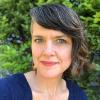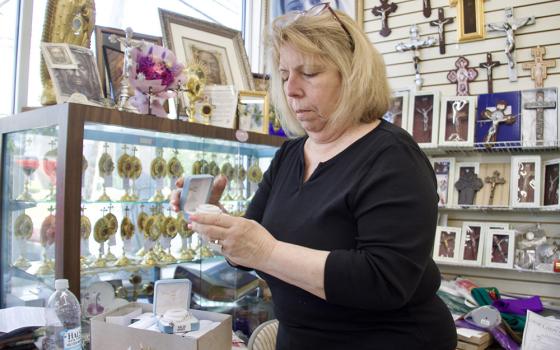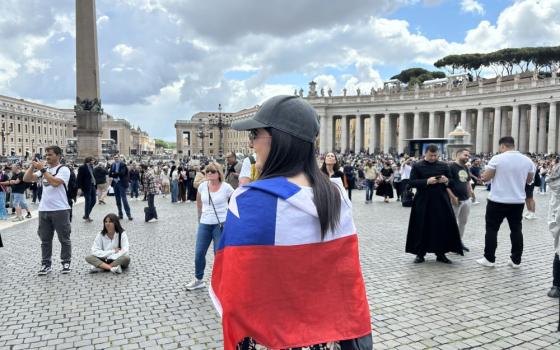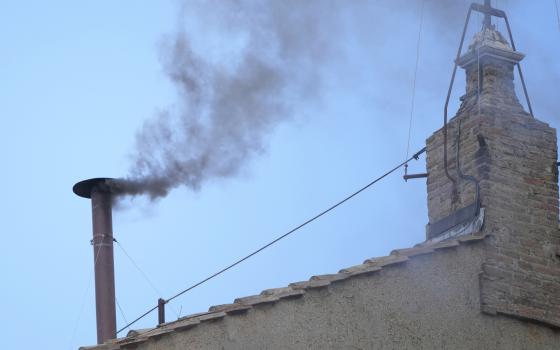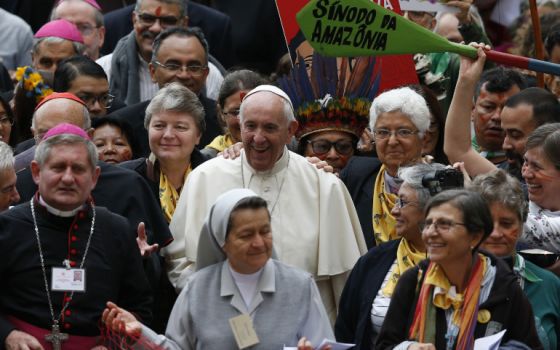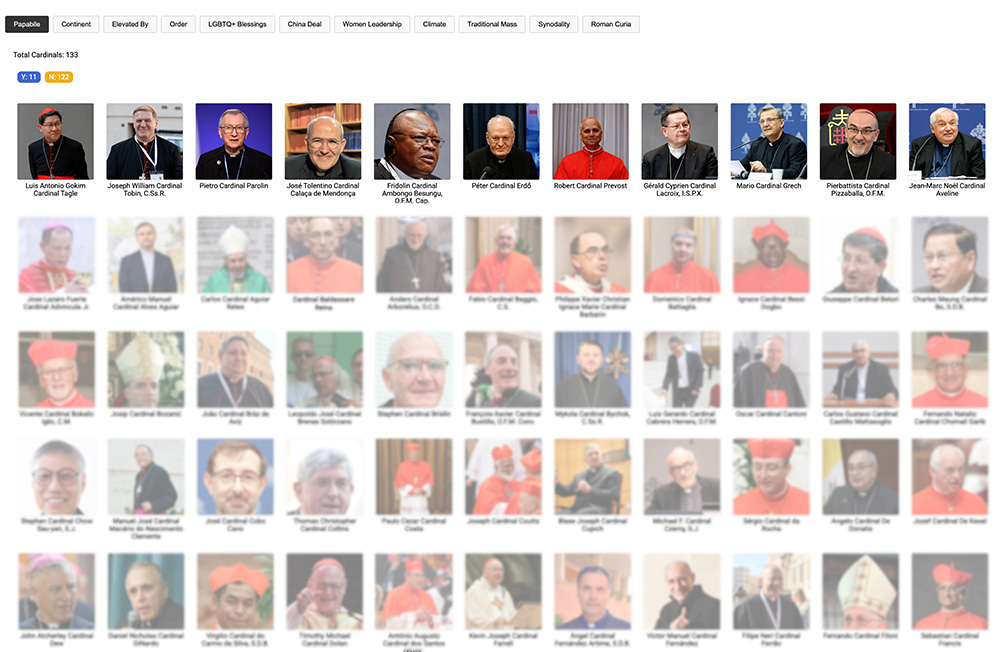
(NCR screenshot/Dan DeLorenzo)
When the 133 cardinal electors enter the Sistine Chapel Wednesday (May 7) to select the next leader of the Roman Catholic Church, the influence of Pope Francis will be inside with them — not just in the eight in 10 he named as cardinals, but also in their support for central themes of his 12-year papacy.
Francis' powerful sway over the forthcoming conclave is revealed in a National Catholic Reporter analysis of the biographies, background, articles, speeches, homilies and media interviews of members of the College of Cardinals, providing for the first time an in-depth look into the views of the men who will select the successor to St. Peter.
Among NCR's findings:
- At least 100 of the cardinals have embraced synodality, a cornerstone of Francis' pontificate that calls for increased lay participation, reformed governing structures, and greater accountability among church leadership.
- Nearly half the cardinals support Francis' focus on climate change and care of creation, another signature issue for the late pontiff, who issued two major documents imploring the world to take urgent action to preserve the planet.
- On other issues, support among the electing cardinals is more mixed or uncertain. It is unclear what most cardinals think about promoting women into church leadership positions, another Francis initiative, and blessings for same-sex couples. There is lack of clarity because few statements could be found indicating the views of scores of cardinals.
The data, compiled by more than a dozen NCR journalists through research on each of the cardinal electors, can be seen in a public interactive database for readers to search and sort by demographics, geographic location and experience in the Roman Curia.
As part of a monthslong review, NCR examined each cardinal elector for his positions on synodality; same-sex blessings; women's leadership in the church; climate change; the Latin Mass; and the Holy See-China agreement.
The global Catholic Church lacks political parties and fits poorly along left-right ideological lines common to U.S. political debate. Yet NCR's first examination of what cardinals have said on some of the major topics in the church of the past decade offers some insights into the men who will choose the next pope from their own ranks.
How to use this database
Click each tab to view information on each of the cardinals who will be electing the next pope. You can sort cardinals by birth continent, religious order, which pope made them a cardinal, as well as their stances on seven issues facing the church. Cardinals making NCR's "papabile" list can also be highlighted.
Hover over each cardinal to learn more about him. A green dot next to an issue indicates the cardinal has expressed support for positions and teachings that generally align with those of Pope Francis. A red dot indicates disagreement with Francis' stances, and a gray dot means the cardinal's position is unclear. (For more information, see methodology sidebar below.)
Advertisement
While Francis selected an overwhelming number of the cardinals — 108 — that does not necessarily mean the conclave will select a carbon copy of the late Jorge Mario Bergoglio. Cardinals' viewpoints are only one factor in how votes are cast. Other elements include the disposition and judgment of the cardinals, potential controversies in their past — both known and not made public. Also weighing on the decision: the global needs of the church for 1.4 billion Catholics.
In many cases, information regarding a cardinal's stance on a particular topic was not readily available.
NCR journalists could not determine many cardinals' views regarding the controversial 2018 pact Francis struck with China's communist government that allowed the Chinese to have a role in bishop appointments.
Only nine cardinals were found to speak publicly on the issue. Notably, two NCR papal front-runners — Cardinal Pietro Parolin and Cardinal Luis Tagle — both have expressed support for the China deal.
A similar lack of clarity was found with views on the Latin Mass, and Francis' 2021 motu proprio letter that limited its celebration. Seventeen cardinals have voiced concerns over celebration of the Latin Mass, compared to 24 who have lent more support to it. Views for the remaining 92 were not clear.
The lack of detailed information on cardinals is to be expected when it comes to conclaves, said Natalia Imperatori-Lee, a theologian studying Catholic ecclesiology and chair of the religion and philosophy department at Manhattan College.
"Most of the information going into the conclave is 'unknown' — maybe even to some of the cardinals themselves," Imperatori-Lee said.
Most Francis appointees back synodality
Synodality — Francis' vision of a more transparent, accountable, inclusive and welcoming church — has been a major focus during the general congregations, the daily pre-conclave meetings where all cardinals gather to discern the needs of the church and deliver speeches.
A total of 105 cardinals have demonstrated an embrace of synodality, according to NCR's research. Ninety-two of those cardinals were given their red hats by Francis. In comparison, seven cardinals have expressed opposition to synodality principles; of those, three were made cardinals by Francis, three by Pope Benedict XVI and one by Pope John Paul II.
Francis convened the synod on synodality from 2021 to 2024. Throughout the multiyear process, advocates of synodality championed a church with increased participation of non-clergy through new ministries and greater inclusivity of previously marginalized groups, alongside reforms to church governing structures, transparency and accountability among church leadership.
Emphasis on synodality appears to correlate with several other issues that NCR examined. For instance, all 31 cardinals who have shown an openness to women leadership in the church also have endorsed synodality.
On the topic of blessing same-sex couples, all but three of the 29 who have supported Fiducia Supplicans — the 2023 Vatican document on pastoral blessings — also championed synodality.
Agreement with Francis on a number of issues is in some ways expected.
Francis, who died April 21, appointed 81% of the cardinals who will soon be locked together inside the Sistine Chapel, where under the soaring frescos of Michelangelo they will decide who will sit on the chair of St. Peter.
Among the papabile, the Italian term for papal contenders, is Cardinal Mario Grech of Malta, who served as secretary-general of the Synod of Bishops and oversaw the 2021-24 synod on synodality. In a 2022 message on synodality's ties to the 1962-65 Second Vatican Council, he defined a synodal church by three words: "communion, participation and mission."
Grech wrote that Catholics are called to build a church of "women and men who together, in the diversity of ministries and charisms received, actively participate in the establishment of the kingdom of God, with the missionary impetus of bringing to all the joyful witness of Christ, the only savior of the world."
Cardinal Cristóbal López Romero of Spain, also a participant in the synod on synodality, is another potential papal candidate who was one of Francis' strong backers of a more synodal church.
"[Synodality] doesn't divide, but there are different positions, and we'll have to work so everyone understands what synodality means," he said in a recent interview with the Argentine newspaper La Nación.
American Cardinal Robert Prevost, too, has been vocal in support of synodality, telling Vatican News in 2023 it offers a possible antidote to polarization in the church.
Cardinals and women's leadership
About 1 in 5 cardinal electors has expressed some openness to women's leadership in the church, according to NCR's database. The 30 include four U.S. prelates, one U.S.-born cardinal who works in the Curia, and four men on NCR's list of top papal contenders.
Still, in the case of a sizable number of cardinals, their views on women's leadership were unknown, indicating this is a topic many choose not to speak about publicly. This may not be surprising, since the information-gathering stage of the bishop selection process, at least under Pope John Paul II, included confirming that the potential prelate had never openly supported women's ordination.
NCR reporters reviewed cardinals' general public support for women in stronger leadership roles, along with the prelates' positions on ordination, including women deacons.
Among those seen as favorable toward women's leadership are five Americans: Cardinal Blase Cupich of Chicago; Cardinal Robert McElroy of Washington, D.C.; Cardinal Joseph Tobin of Newark, New Jersey; Cardinal Wilton Gregory, recently retired from Washington, D.C.; and Chicago-born Cardinal Robert Prevost, who heads the Vatican Dicastery for Bishops.
McElroy has said he favors restoring women to the diaconate, while Cupich has long advocated for bringing more women's voices into leadership. He praised Pope Francis' creation of the first commission to study the issue of women deacons, saying, "Women deserve to be brought more fully into the decision-making of the church."
Both Tobin and Prevost are on NCR's list of papal contenders, as are Tagle of the Philippines and Grech of Malta, who were also noted as open to women's leadership.
Grech was once seen as conservative, but was becoming more open even before Francis appointed him as secretary general of the Synod of Bishops. In an interview with a Swiss publication in March 2024, he expressed support for women deacons, saying it would not be a "revolution" but rather a "natural deepening of the Lord's will."
Tobin has spoken positively about women's leadership, saying in 2018, "I can't imagine a diocese that would want to minister in the fullness of the church's mission without having the voice of women represented in its decisions." In an interview with the Jesuitical podcast last year, he said that the "gifts and role of women" would be an appropriate topic for a future synod.
Although Prevost may be open to some leadership roles for women, he seems opposed to ordination to priesthood or even the diaconate. In 2023, he said, "Clericalizing women doesn't necessarily solve a problem. It might make a new problem."
While Tagle served on the International Theological Commission committee that studied the issue of women deacons in 2002, he has not spoken publicly on the issue. He has called for strengthening the role of women in the church.
Some of the more outspoken cardinals on this issue are not considered likely to be pope. They include Hong Kong Cardinal Stephen Chow and Cardinal Timothy Radcliffe, an English Dominican priest made a cardinal without becoming a bishop first.
Radcliffe has said the church "needs to hear the preaching of women." Chow, in a homily in 2022, addressed "our ordained brothers" but also expressed hope for "ordained sisters" in the future.
Cardinals and ecology
A total of 64 cardinals have expressed support for the Catholic Church addressing climate change and support for Francis' overall emphasis on the church's teaching around caring for God's creation, according to NCR's research.
The vast majority of those who expressed support, 56, were appointed by Francis, who dedicated his 2015 encyclical to the topic of ecology in "Laudato Si', on Care for Our Common Home."
Those endorsing the church engaging the global threat of climate change include roughly half of the cardinal electors on five continents: seven of 16 in Africa; 13 of 21 in Asia; 13 of 18 in North America; eight of 17 in South America; and all three Oceania cardinals. Twenty of Europe's 58 cardinals have also supported the church addressing climate change.
Among leading papabile, Tagle stands out as one of Francis' key allies on issues of climate change and integral ecology.
The former archbishop of Manila, who now heads of the Vatican's Dicastery for Evangelization, Tagle has highlighted the suffering wrought by increasingly stronger storms and typhoons on island nations like the Philippines and upon the world's poorest communities.
"The pope reminds us of our common home, our sister, our mother earth ... who now cries out to all of us because of the harm inflicted on her due to our irresponsible use or abuse of the goods God has endowed her," he said in a September 2015 forum on Laudato Si'.
Other Vatican officials have been top surrogates for Francis' teachings on the environment.
Parolin, Holy See secretary of state and possible contender in the conclave, has represented the pope at numerous United Nations climate summits. Under his tenure, the city-state officially joined the Paris Agreement, setting a goal to reach net-zero carbon emissions no later than 2050.
Cardinal Michael Czerny, head of the Dicastery for Promoting Integral Human Development, has played a central role in articulating Laudato Si', and its 2023 follow-up, Laudate Deum, including overseeing the Vatican's Laudato Si' Action Platform. His unflinching language on climate change and other environmental challenges has stood out among Catholic prelates.
"We are at a critical historical moment where actions today will determine the fate of generations to come," he said at a 2023 event. "The challenge ahead is monumental; we need nothing short of a 'bold cultural revolution' to respond to it adequately."
Considered a leading papal contender 12 years ago, but not this year, Cardinal Peter Turkson led the human development dicastery before Czerny. The Ghanaian was a key drafter of Laudato Si', delivering the landmark encyclical around the world in parish halls, university campuses and negotiating halls.
Another papabile, Cardinal Fridolin Ambongo Besungu of the Democratic Republic of Congo, has emerged as a leader among African Catholics on ecological crises facing their continent, namely more climate-intensified droughts and exploitation of Africa's natural resources by multinational companies, including in the globally critical Congo Basin.
"Wherever you look on this continent, a continent already struggling due to an unjust global economic system, you see climate change holding back the potential for development," Ambongo Besungu, president of the Episcopal Conference of Africa and Madagascar, said at a news conference ahead of the 2022 U.N. climate summit in Egypt.
Among the Americans, Tobin has spoken of the need for countries not only to mitigate the impacts of climate change but to develop and share resources to adapt to and recover from climate impacts. As Indianapolis archbishop, he created a creation care commission, and in his current Newark Archdiocese has commissioned a Laudato Si' Action Plan and enrolled in the Laudato Si' Action Platform.
Cardinals and gay blessings
Just before Christmas in 2023, the Vatican released Fiducia Supplicans, a document that permits clergy to offer spontaneous and informal blessings to individuals in same-sex unions.
The text caused a global stir and many Catholics initially were perplexed over the document's meaning. Yet it is arguably the most significant instance of Francis simultaneously maintaining church teaching — the catechism still says homosexual acts are "intrinsically disordered" — and offering a more pastoral approach to those in the LGBTQ community.
Individuals seeking God's love and mercy, says the document, should not be subject to "an exhaustive moral analysis" as a precondition.
Based on NCR's analysis, about one in five papal electors have indicated support for Fiducia Supplicans, while about 13% criticized or clearly suggested they do not support it.
The stance taken by the majority of cardinals who will be electing the next pontiff is unclear or unknown. For most of the 12 cardinals NCR deems papabile, their position on the document is likewise not known.
According to the NCR database, two potential papal contenders, Cardinals Tobin and Jean-Marc Aveline of Marseille, France, all have spoken favorably of Fiducia Supplicans.
Ambongo Besungu, who served as one of Francis' advisers, is the only cardinal on the NCR papal front-runner list to publicly voice strong concerns about the document, according to NCR analysis.
Soon after the declaration was issued, Ambongo Besungu flew to Rome and met with Francis to discuss concerns about the document and its fallout in the African continent, where homosexuality is often illegal, and harsh penalties are imposed on LGBTQ people.
Ambongo Besungu got what he went to Rome to get. A subsequent Vatican-approved document signed by the cardinal from Congo was titled: "No blessing for homosexual couples in the African churches."
Tobin, meanwhile, issued a statement following the release of Fiducia Supplicans that reiterated the church's teaching on marriage remains unchanged but that the text "underscores the importance of blessings as a support for people on their spiritual journeys."
The New Jersey cardinal has welcomed an LGBTQ pilgrimage to his cathedral in Newark and signed a statement with six other U.S. bishops showing their concern for at-risk LGBTQ youths.
"Most of all, know that God created you, God loves you and God is on your side," read the joint statement.
Among the 133 total papal electors, there were wide-ranging reactions to Fiducia Supplicans.
German Cardinal Gerhard Müller, former head of Vatican's powerful doctrinal office who was dismissed by Francis in 2017, was long at odds with the late pope's more pastoral and welcoming posture toward LGBTQ individuals.
Two years ago, Müller said it was blasphemy to bless same-sex couples, and he recently told a Vatican news outlet the next pope must confront the church's "gay lobby" and take a strong stance on doctrine.
Müller recently told America magazine that Fiducia Supplicans was unnecessary. "Why create problems when the previous situation was clearer, even if not entirely clear?" he said.
In 2024, the cardinal had said efforts to clarify the document added to confusion about its meaning. The church must not acquiesce to "absolutely wrong LGBT and woke ideology," said Müller.
McElroy, whom Francis appointed archbishop of Washington, D.C., in January, said in remarks last year that it is "wholly legitimate for a priest to personally decline to perform the blessings outlined in 'Fiducia,' because he believes that to do so will undermine the strength of that union."
But the cardinal also denounced some of the opposition to such blessings as an "an enduring animus among far too many towards LGBT persons."
His words echoed a 2023 essay in which he wrote that the "visceral animus toward members of the LGBTQ communities" within the church is a "demonic mystery of the human soul."
This investigation was led by Executive Editor James V. Grimaldi. The research and reporting were managed by Carol Zimmermann. The visualization of the database was designed by Dan DeLorenzo. Vatican correspondent Christopher White helped coordinate the research. Data was collected by NCR journalists Olivia Bardo, Camillio Barone, Stephanie Clary, Katie Collins Scott, Shannon Evans, Brian Fraga, Barbara Fraze, Brian Roewe, Heidi Schlumpf, Julian Tiburcio, White, Stephanie Yeagle, Patricia Zapor and Zimmermann. The database was edited and fact checked by Tiburcio. The story was copy edited by Teresa Malcolm.
The National Catholic Reporter's Rome Bureau is made possible in part by the generosity of Joan and Bob McGrath. NCR's investigative projects are made possible in part by the generous support of Annette Lomont.
This story was updated May 7 to include Cardinal Raymond Burke, who was inadvertently left off the original data chart, and remove Cardinal Mar George Alencherry, who turned 80 on April 19.


